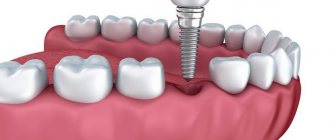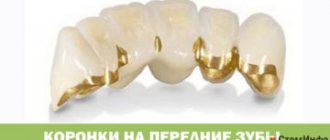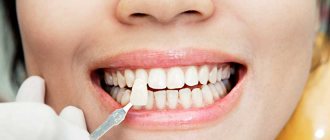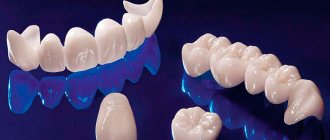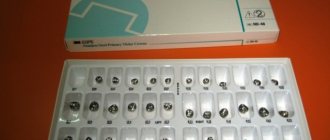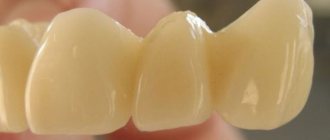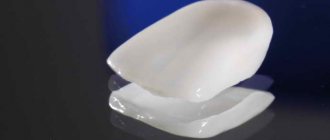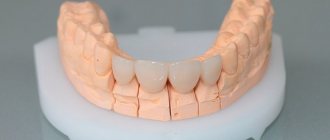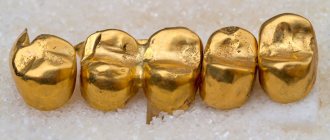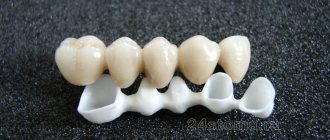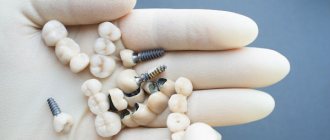Various materials can be used for prosthetics and dental restoration in modern dentistry, and one of the most popular types is ceramics or dental porcelain. This type of material is highly valued by professionals for its increased strength and aesthetics and the ability to create various types of orthopedic structures from it. Ceramics can be successfully used for the production of veneers, inlays, dental bridges, and all-ceramic dental crowns.
We will talk in detail about what an all-ceramic dental crown is in the following sections of the article. After reading the material, you will become familiar with the design of an all-ceramic crown, its features, and indications for prosthetics with this type of structure.
All-ceramic dental crown: features
All-ceramic dental crowns are also called metal-free, because metals and their alloys are not used in the manufacture of this type of prosthesis. For this reason, installation of an all-metal crown on teeth is indicated primarily for people who have an individual allergic reaction to different types of metals.
Until recently, all-ceramic crowns were used exclusively for the restoration of anterior teeth. This was due to the insufficient strength of dental porcelain, which was previously used in the prosthetic procedure. But thanks to the emergence of innovative technologies in dentistry, it has become possible to use all-ceramic crowns to restore any lost tooth in the oral cavity: modern ceramics are characterized by increased strength and reliability. Moreover, heavy-duty removable and bridge-type prostheses are produced from ceramics.
The price of an all-ceramic crown will be higher than prices for other types of structures, but at the same time it is fully justified by its excellent performance characteristics.
Crowns, veneers, inlays, partial crowns “E-MAX”
Ceramic crowns made from E.max material are actively used in the restoration of severely damaged teeth. These crowns look very natural on both back and front teeth. They are strong and, unlike metal ones, do not oxidize. Ceramic crowns have served their owners for decades. Ceramics does not come into contact with the internal fluids of the body, so it perceives such crowns as its own enamel, this eliminates any unpleasant sensations. Soon you will forget that you had crowns installed.
E.max veneers are thin ceramic overlays 0.3-0.6 mm thick that are glued to the front of the tooth. Using Imax ceramics helps improve the appearance of teeth without major dental intervention. A thin layer of enamel is removed from the surface of the tooth, which replaces it with a durable ceramic veneer. E.max veneers are perfectly molded to the shape of the tooth, so there are no visible differences or discomfort. At the same time, they hold securely on the tooth and give it the desired shape and color.
E.max ceramic inlays are widely used to fill cavities formed in teeth, for example, after cleaning caries. If previously only fillings were used for these purposes, today ceramic inlays make it possible not only to close cavities in the teeth, but also to return them to their original shape. Ceramic inlays are much more reliable than fillings, so you don’t have to worry about their safety.
E.max partial crowns allow you to replace only damaged areas of the tooth surface, while preserving the patient’s own dental tissue as much as possible. These crowns help accurately recreate the shape of the tooth and preserve its natural appearance. A wide selection of materials guarantees precise selection of the appropriate color and transparency and the production of partial crowns even for front teeth.
Indications for the use of all-ceramic dental crowns in prosthetics
Prosthetics with all-ceramic crowns have a certain number of indications:
1. Metal-free structures are used for the restoration of one or several dental units located next to each other or at some distance.
2. Elimination of aesthetic defects in the area of the front teeth in rows.
3. The use of all-metal dental crowns is advisable if the patient has some pathologies of the natural enamel coating: increased abrasion, developmental anomalies, significant surface damage.
All-ceramic crowns will be the best option if the patient is allergic to metals and their alloys. You can get detailed advice on indications and contraindications for prosthetics with all-ceramic crowns from the specialists of our Vanstom clinic in Moscow! Prosthetics with all-ceramic crowns: technologies
Modern all-ceramic crowns have optimal functional characteristics: they are durable, reliable in use, and have transparency indicators identical to natural teeth. Externally, it is almost impossible to distinguish an all-ceramic crown from a natural tooth.
At the current time in dentistry, there are two main technologies for the production of all-ceramic crowns: manual and computerized. Let us consider in detail the nuances of each method of producing ceramic dentures.
All-ceramic crowns
from 19,700 rub. More about prices
We have been working since 1994
we are one of the first to open private dentistry in Moscow
Best materials
only new and modern equipment for dental treatment
Free
consultation with a dentist
Payment options
- cash
- plastic cards
- cashless payments
Doctors' experience
- with great experience
- graduated
- conference participants
Life time
According to practical observations, porcelain crowns are quite capable of serving their owner from 10 to 15 years. At the same time, a number of factors can shorten their service life.
- Porcelain is a rather fragile material. Therefore, a small crack in the crown may well grow over time, leading to its complete unusability.
- Please note that artificial crowns wear out faster in people who have the habit of clenching their teeth tightly. The slightest destruction of the tooth allows caries to penetrate under the surface of the crown, which cannot harm the crown itself, but will accelerate the destruction of the tooth underneath.
If you feel that the porcelain crown has become loose or is subject to displacement when chewing food, you should under no circumstances try to install it yourself! To resolve this problem, a visit to an orthopedic dentist is necessary.
You can get crowns on your teeth in Moscow at a cost-effective rate at Dantistoff Scientific Dentistry. Orthopedic dentists, candidates of sciences of the highest category. Sign up.
Manual technology for the production of all-ceramic crowns
The production process of an all-ceramic crown using this method will be divided into several stages:
- Examination of the patient and taking dental impressions;
- Making a plaster model of the structure, which is carried out by a technician in a specialized laboratory;
- Modeling of a future all-ceramic dental crown;
- Fabrication of the frame and its cladding;
- Coating the finished structure with a layer of dental porcelain and grinding its surface to perfect smoothness.
It is important to note that the finishing layer on an all-ceramic crown can be created not only by layer-by-layer application, but also by coloring. It is advisable to use colored dentures for the restoration of chewing teeth, since in this case the fundamental characteristics of the design will be strength and durability. But in the restoration of the front rows of teeth, it is better to use all-ceramic crowns with a finish created in layers - they are impeccable in terms of aesthetics, which is so important for the smile area.
Ceramic crowns for front teeth
Many experts believe that ceramic dental crowns can only be used for prosthetics of the front teeth. Meanwhile, new generation pressed ceramics make it possible to make not only highly aesthetic, but also highly durable structures. The absence of a metal frame in such prostheses is not a sign of fragility or unreliability. Ceramic crowns for chewing teeth also have a place in dental practice.
Computer technology for manufacturing all-ceramic crowns
This technology for creating all-ceramic dental crowns is the most modern; it uses specialized CAD/CAM equipment, with which a specialist can obtain an ultra-precise 3D image of the patient’s jaws. This makes it possible to create an all-ceramic prosthesis with optimal performance characteristics. Based on the computer model, an all-ceramic dental crown will be made in the future. Its production process consists of the following stages:
- Using a scanner, the specialist receives a computer model of the patient’s jaw, which speeds up the process of prosthetics as a whole. When using a virtual model, there is no need to waste time making a plaster cast;
- Next, also on a computer, the future all-ceramic crown is modeled;
- The finished crown model is transferred to a special machine on which the prosthesis is turned.
The process ends with the installation of an all-ceramic dental crown in the patient’s oral cavity. At this stage, final polishing of the prosthesis can also be performed to obtain maximum aesthetics of an all-ceramic crown.
In domestic aesthetic dentistry, the following technologies for computer-aided creation of all-ceramic crowns are popular: Katana, ZirconZahn, Cerec, Organical. Separately, it is worth mentioning the growing demand for prosthetics with all-ceramic emax crowns. Structures produced using this technology are distinguished by high strength, aesthetics, and high levels of biocompatibility with natural tissues of the human body. They do not require complex specific care and provide excellent results in prosthetics, 100% solving the problem of lost teeth.
You can find out more about the prosthetic service with all-ceramic emax crowns by making an appointment with a specialist at our Vanstom clinic in Moscow!
Are there any contraindications to dental prosthetics with all-ceramic crowns?
There are no strict contraindications to dental prosthetics with all-ceramic crowns, but there are limitations due to which treatment will have to be postponed until they are completely eliminated. In particular, prosthetics with all-ceramic crowns cannot be performed during pregnancy and lactation, or with weakened immunity.
Before prosthetics with all-ceramic crowns, it is imperative to cure caries and other diseases of the teeth and oral cavity, which will be identified at the diagnostic stage.
NOTE: Before prosthetics with all-ceramic and other types of crowns, it is imperative to undergo a procedure for sanitation of the oral cavity. During its course, hard and soft plaque is removed from the teeth, which allows the doctor to accurately select the color of the future prosthesis and, in addition, eliminates the risks of developing inflammation and caries under the already installed crown in the future.
Advantages of using all-ceramic dental crowns in prosthetics
All-ceramic dental crowns compare favorably with analogs made from other materials due to the following advantages:
1. High aesthetics. The use of all-ceramic dental crowns allows you to obtain the most aesthetic appearance of the restored dental units. Ceramics has optimal transparency, which makes it outwardly indistinguishable from natural tooth enamel.
2. Installation of all-ceramic crowns is not capable of causing any negative or dangerous consequences for human health. Moreover, when using this type of prosthesis, tooth trauma will be minimal, since its installation does not require significant grinding of a healthy unit.
All-ceramic crowns are easy to use: they are light in weight, do not rub the soft tissues of the oral cavity, and do not create excessive stress on natural dental units. The advantages of all-metal structures definitely include their solid durability - a crown can last for more than ten years without loss of aesthetics and functionality. An all-ceramic crown does not require complex maintenance, but it must be regular, since the service life of the prosthesis and its preservation of all useful qualities depend on this.
Would you like to learn more about all-ceramic crowns and get high-quality prosthetic services at affordable prices! Come to our dentistry in Moscow - Vanstom!
Prices for metal-free ceramics e-max (crowns, veneers, inlays)
| Code services | Name of service | Service cost | |
| 15 | VENEERS E.MAX ivoclar (pressed ceramics) | 18 000 | |
| 16 | E.MAX TABS | 10 000 | |
| 13 | E.Max metal-free ceramic crowns | 15 000 | |
Care technology for dental restorations made of E.max ceramics
By installing E.max ceramics, you don’t have to worry about the fact that it will require special care. In fact, this material is hygienic and easy to clean, since it does not accumulate tartar and plaque, but still requires regular brushing, like regular teeth. Along with regular daily teeth cleaning, once a year it is necessary to undergo a preventive examination and professional cleaning.
E.max ceramics behaves well during such cleaning by a hygienist and does not create restrictions when caring for other teeth. After installing the ceramics, our dentist will tell you in detail what products should be used when caring for your teeth so that the ceramics last as long as possible.
All-ceramic crowns: price
| — Restoration of the dentition using 1 unit of ceramic crown (Empress) | 18,000 rub. |
| — Restoration of the dentition using 1 unit of ceramic crown per implant (Empress) | 20,000 rub. |
| — Dental restoration using 1 unit of ceramic crown on cerconium oxide (CEREC) | 20,000 rub. |
| — Dental restoration using 1 unit of crown per implant (CEREC) | 24500 rub. |
| — Fixation of the crown with glass ionomer cement, composite | 600 rub. |
| — Taking a single-layer impression and casting a non-separable model | 300 rub. |
| — Taking a two-layer impression and casting a collapsible model | 800 rub. |
View price list
Metal-free ceramics E-max
Crowns using E-max technology, one of the newest products. It is made from lithium disilicate. This crown is distinguished by the fact that it has increased strength and excellent appearance. Such products are installed on very badly damaged teeth.
- High strength ceramic crowns.
- Aesthetics. E-max are considered one of the most natural looking crowns. The unique manufacturing technology allows the specialist to regulate not only the color, but also the level of transparency of the product. In this way, it is possible to achieve an absolute appearance similar to natural teeth.
- Versatility. Any type of tooth or bridge can be restored. Generally, all-ceramic crowns are not used for posterior teeth. New technology has made it possible to overcome this barrier.
- Life time. All-ceramic E-max crowns last more than 15 years. This is the highest indicator among similar structures.
- Biocompatibility. Crowns do not cause allergies. This is achieved through the use of specialized new generation materials.
- Easy to install. Due to the fact that these crowns are much thinner than all others (even zirconium), their installation does not require much damage to the tooth. At the same time, the sealing density is maximum.
Advantages of metal-free crowns
- High aesthetic qualities, the crown fits tightly to the gum.
- The color of the crown is completely natural. Unlike metal-ceramics, metal-free crowns are almost impossible to distinguish from a living tooth.
- Excellent biological compatibility, which makes it possible to avoid the occurrence of an allergic reaction.
- Does not cause inflammation of the gums, and makes it possible to restore functionality.
- Durability and high strength compared to other types of crowns.
- Crowns withstand mechanical pressure very well.
- During installation, there is no need to cut down too much natural enamel.
Zirconium dioxide structures
Zirconium oxide products are manufactured by milling using CAD/CAM technology. Structures made of zirconium dioxide have good aesthetic properties and high strength. They can be used to restore almost any tooth, even chewing ones. The frame of the product is made of zirconium dioxide, and the lining is made of porcelain. The service life of zirconium dioxide crowns reaches 10-20 years. This is one of the main advantages of using this material.
- They look like real teeth: they have the same shape and light transmission (this is clearly visible in the photo before and after installation).
- The color of the structure inside is white, not gray, like most metals and alloys, which eliminates the unnatural gray glow of the crown from the inside.
- They are the least allergenic compared to all other crowns and are most biocompatible with oral tissues and saliva.
- Does not change color over time.
- Very durable.
- Precisely manufactured (this is due to the fact that the human factor is completely eliminated: a computer simulation of the cap from zirconium dioxide takes place and a milling machine cuts out the desired shape).
